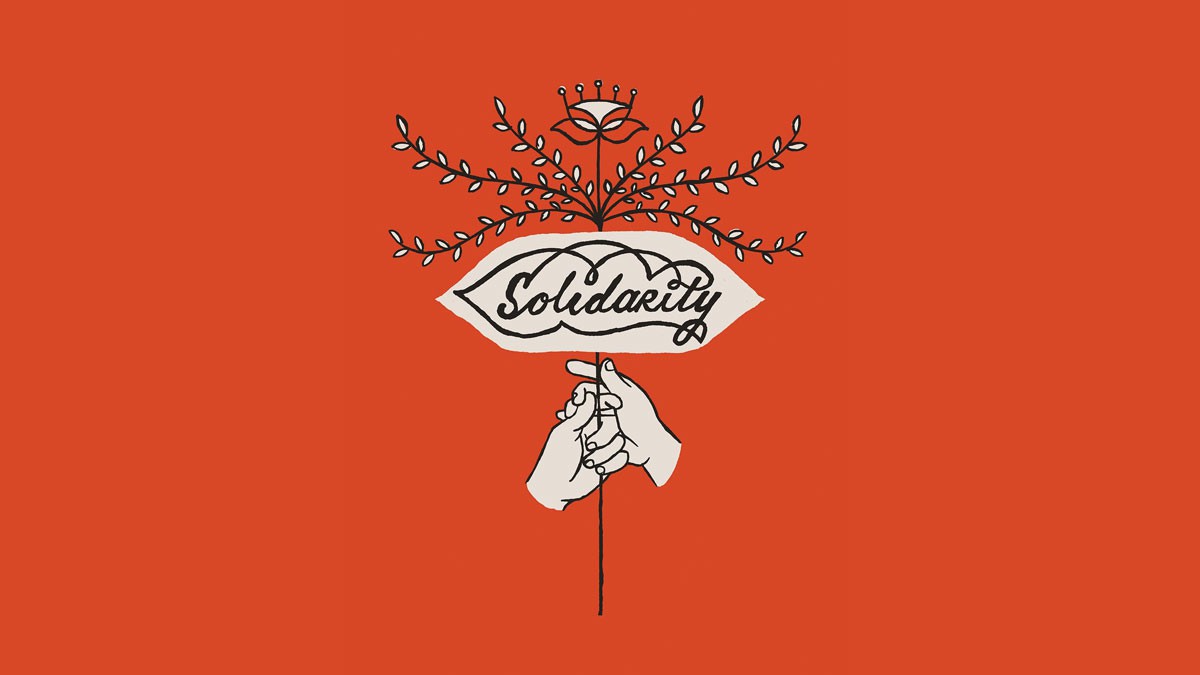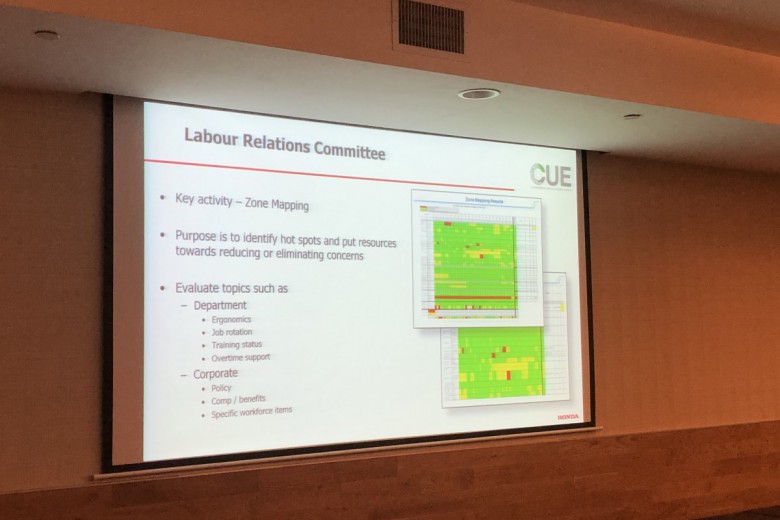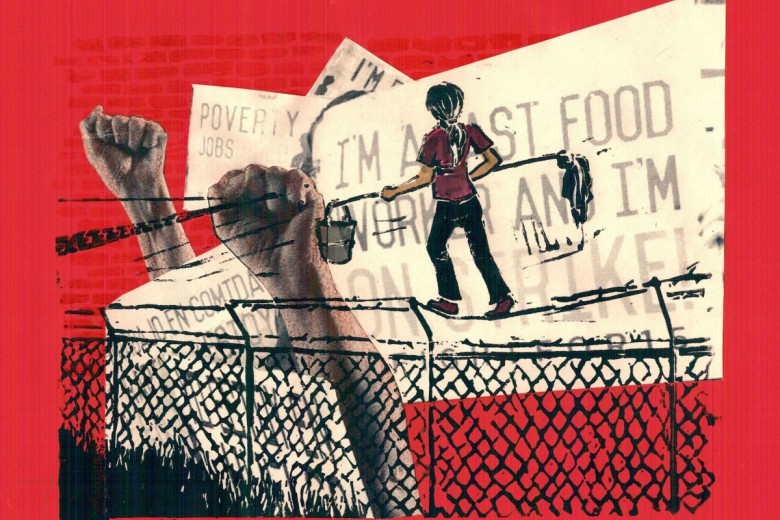Workers are finding ways to organize despite the fear and uncertainty of the COVID-19 crisis. Through courageous public actions and less-visible organizing strategies, they are confronting the inhumane logic of racial capitalism that says our labour is essential but our lives are not.
We know that employers won’t respect workers’ rights without a fight. Neither will governments that put profits before people and undermine already limited workplace protections. The only thing that we can rely on is the collective power we build by organizing together. Workers are demonstrating this by refusing to do unsafe work, exposing bad bosses, forming unions, engaging in mutual aid, and building coalitions to fight for a more egalitarian society.
1. Direct action: work refusals and walkouts
On March 25, all “non-essential” workplaces in Ontario and Quebec were shut down. That same day, in a video that circulated widely online, Jack Da Silva addressed a group of construction workers – an industry deemed essential – about the lack of safety protections at their worksite. “The electricians walked out. That was their choice. You have the same choice. Let’s look out for each other.” Da Silva, who is a union rep with LiUNA Local 183, added, “This [employer] does not own anybody. You don’t need to be intimidated.”
Widespread concerns about unsafe working conditions resulted in an unprecedented number of work refusals. In one high-profile incident, 38 bus drivers in Toronto refused to go out on shift due to a lack of personal protective equipment (PPE) supplied by their employer. However, the Toronto Star revealed that not a single one of the 213 work refusals filed in Ontario were upheld by the Ministry of Labour.
“This [employer] does not own anybody. You don’t need to be intimidated.”
Workers continue to organize despite the lack of government support and risks associated with taking action. Eleven nurses in London, Ontario made the incredibly difficult decision of refusing to work when their employer denied them access to N95 masks. After their public stand, the hospital reversed its position.
On a larger scale, health-care workers with the Ontario Council of Hospital Unions organized public protests in over a dozen cities on May 14, the latest in a series of coordinated actions. They demanded better safety protections and an end to the government’s exclusion of tens of thousands of essential workers from “pandemic pay” for frontline staff.
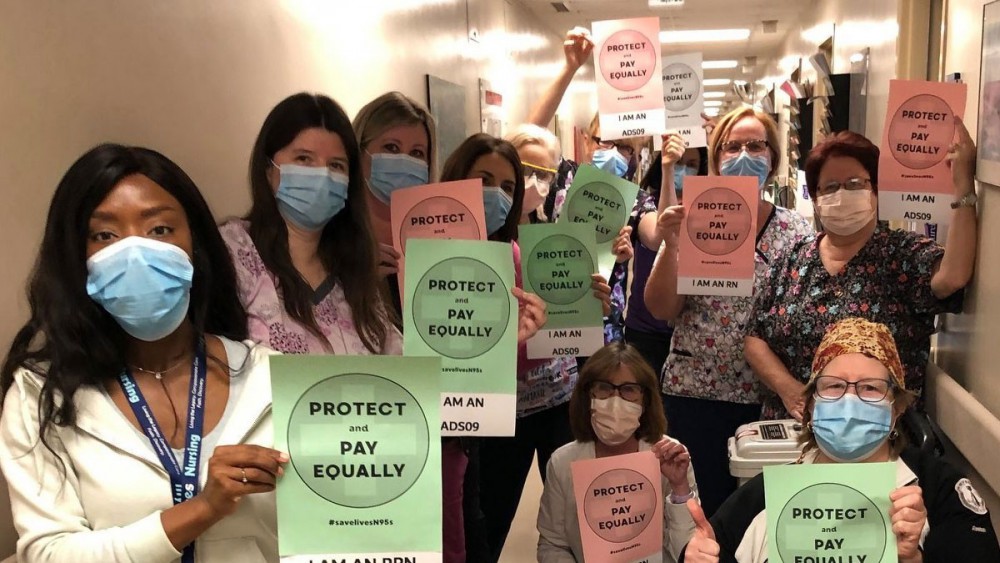
2. Confronting bad bosses: public pressure campaigns
Without sufficient pressure from below, the safety of workers will always be secondary to the pursuit of profits. Non-union workers have leveraged support from Bad Boss Report, an online action group started by labour activists in Toronto and Hamilton, with some success influencing smaller employers. Shortly before the mandatory shutdown, employees at Stag Shop retail stores reached out because they were “terrified going into work” during the pandemic. A social media campaign resulted in the company conceding to the workers’ demands: closing their stores and laying off workers so they could collect Employment Insurance.
Bad Boss Report also helped workers at Fife House, a non-profit housing provider for people living with HIV/AIDS, to make their employer supply more PPE. Reflecting on their learnings, activists with Bad Boss Report wrote, “Employers – not only corporate employers, but also non-profits – won’t prioritize workers unless they are forced to. Employers will wait for the state to force them to do the right thing, and even then, the state’s efforts are often inadequate.”
The Toronto Star revealed that not a single one of the 213 work refusals filed in Ontario were upheld by the Ministry of Labour.
Public pressure alone, without a high-level of workplace organizing and a credible threat of job action, may not yield results. Consider the Cargill meat processing plant in Alberta, the site of the largest COVID-19 outbreak in North America, which is mostly staffed by new immigrants and temporary foreign workers who are members of UFCW Local 401. Public scorn and outdoor protests have not convinced the massive multinational company to close its plant, nor have they led Premier Jason Kenney to offer any assistance, despite 949 workers being infected and three deaths. Government inspectors conducted an inspection via FaceTime and decided that the safety measures being taken by the company were sufficient.
In an effort to spark further action, whistleblowers inside Cargill have enlisted the support of progressive media. Workers shared audio of a company-run telephone town hall with Rank & File, in which employees called out Cargill’s lack of concern for their health and safety. Numerous workers have also spoken out to Progress Alberta, including one who provided this gut-wrenching perspective on maintaining the ‘critical infrastructure’ of meat production at any cost: “There’s no help coming from Cargill. It’s up to you if you can survive. They’ll just replace us if we die. My family can’t replace me.”
3. Seizing the moment: union organizing drives
The crisis has served as a catalyst for some workers to form their own unions. In Halton Region 160 early childhood educators (ECEs) were in the middle of a union drive when the pandemic hit.
Aminah Sheikh, an organizer with the Elementary Teachers’ Federation of Ontario, was not sure if the campaign could continue after school closures were announced for the period following March Break. But when nearly 70 workers turned out for their first Zoom webinar, it was clear that they were gaining rather than losing momentum due to the pandemic.
“As a woman and a Muslim, I want our voices to be heard,” says Sarvath Fatima, a member of the organizing committee and an early childhood educator, in an interview for Rank & File. “When I spoke with my co-workers, there was a similar feeling that life was getting harder with less work and sometimes no jobs for days or even weeks.” Due to the precarious nature of their work as on-call “occasional” employees, “Workers didn’t have much time to talk to each other before,” says Sheikh. “We actually built stronger relationships in a time of social isolation.”
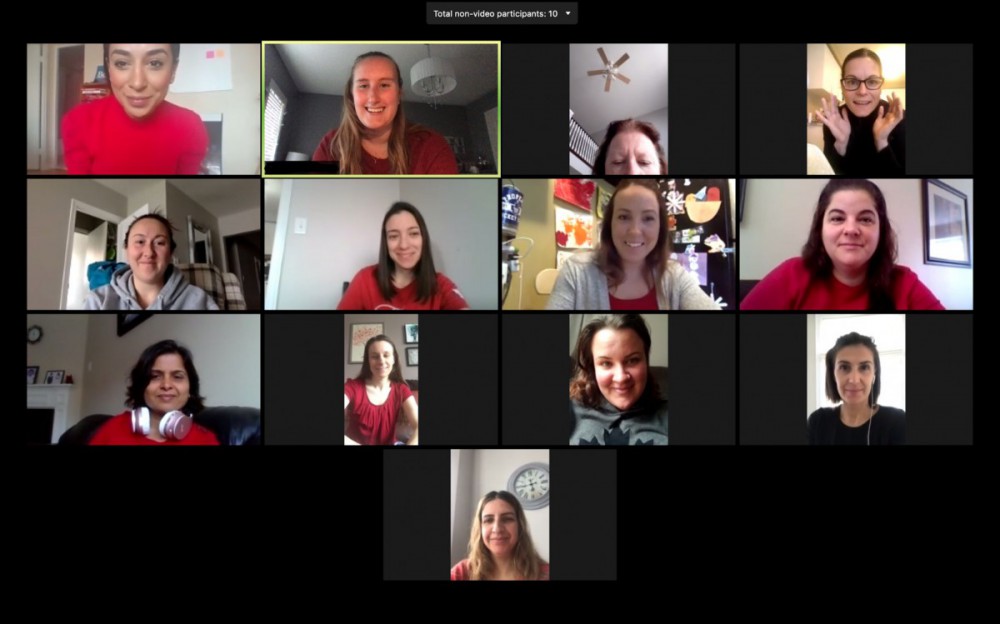
During this difficult moment, the pace of union certifications has slowed. However, unorganized public and private sector health-care workers have formed unions, as have janitors at two sites in North Vancouver with SEIU Local 2. There have also been union drives in sectors less notorious for their precarious working conditions.
Soccer players with the fledgling Canadian Premier League took action after their employer unilaterally decided to withhold 25 per cent of their wages. On April 15, players publicly announced the Professional Footballers Association Canada. The union drive by full-time players who make an average of $30,000 a year was fast-tracked by their desire to have a collective voice in talks with their employer. This sense of urgency was widely felt among the players, with 140 out of 159 players signing electronic union cards within a matter of days.
4. Solidarity, not charity: mutual aid
Workers are taking it upon themselves to support one another during a time of crisis, realizing that employers and governments cannot be counted on to provide the necessities of life, particularly to the most oppressed sections of society.
“Workers didn’t have much time to talk to each other before,” says Sheikh. “We actually built stronger relationships in a time of social isolation.”
Sex workers have been especially hard hit. Many sex workers have seen a devastating drop in their incomes but are ineligible for government support. In response, worker-led organizations Maggie’s and Butterfly – Asian Sex Worker Support Network are coordinating an emergency fund that recently surpassed their $100,000 fundraising goal.
With the cancellation of school nutrition programs due to the outbreak, Toronto education workers started Food for Thought, a food delivery program to support students and their families. Over 85 education workers, in collaboration with students themselves, have delivered almost 2,000 boxes of fresh food.
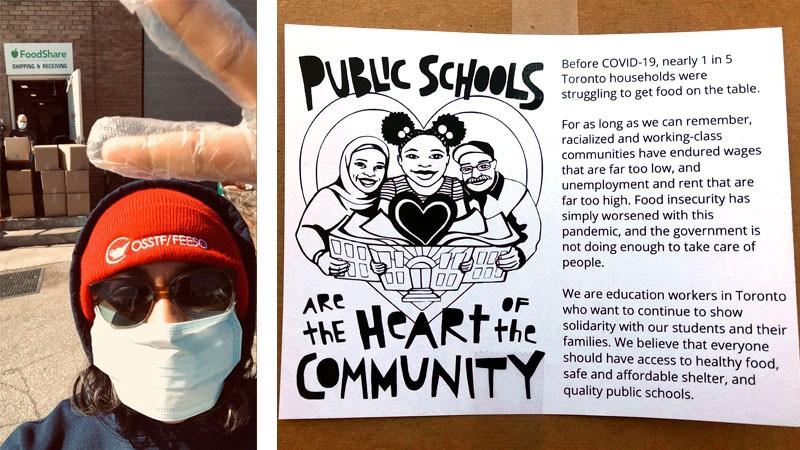
High school teacher Gita Madan, a member of the Ontario Secondary School Teachers’ Federation, sees this work as a way to deepen the relationships of solidarity built between educators and community members during their 2019-20 strikes. “This emergency response may look like charity on the surface, but it actually has deeper roots and a commitment to working together to create broader social change,” she tells Briarpatch. Each food box includes flyers describing the underlying political context that creates food insecurity and the need to confront it together.
5. No going back: visionary organizing
In the context of COVID-19, ideas that were once political non-starters have transformed into realities. Previously ignored, Green Jobs Oshawa’s campaign to retool the former GM Oshawa plant won an important victory. Workers are now making PPE for frontline workers and Green Jobs Oshawa is pushing to scale up production.
Long underpaid frontline workers, including grocery store workers, have received raises and unions are calling to make “pandemic pay” boosts permanent. Legislated paid sick days, another key plank of a decent work agenda, has gained new traction with thousands more backing the Fight for $15 & Fairness’ demands.
“Employers – not only corporate employers, but also non-profits – won’t prioritize workers unless they are forced to."
In British Columbia, the provincial government took over as the employer of all private long-term care workers, and we’re seeing a groundswell of support for national, universal long-term care after reports revealed the disproportionate number of deaths in for-profit facilities.
Undocumented temp agency worker Liliana Trejo joined the Migrant Rights Network in advocating for COVID-19 supports to be extended to all workers regardless of their immigration status. Trejo, who is a member of the Immigrant Workers Centre in Montreal, linked the call for immediate assistance to the equally pressing need for status upon arrival, to overcome the exploitation that non-status and temporary foreign workers face.
“Many undocumented people are working in the line of fire, in essential services, putting their lives at risk, working without status and without rights or protections,” Trejo explains in a video for the Migrant Rights Network. It is time that we be counted and that we be treated with the importance and respect we deserve as part of this economy. It is time for the government to regularize us, to give status to all of us.”
Foodora couriers in Toronto and Mississauga, who have organized together as Foodsters United with CUPW, also joined the fight to ensure that “no one is left behind” from COVID-19 supports. On April 27, in the middle of the pandemic and just two months after the workers won the legal right to unionize, Foodora abruptly announced that it would be ending operations in Canada. In response, couriers staged a physically distanced protest outside of the company’s offices in Toronto. Workers vowed to continue organizing and hinted at the possibility of starting a worker-owned courier co-operative, as couriers in Europe have done.
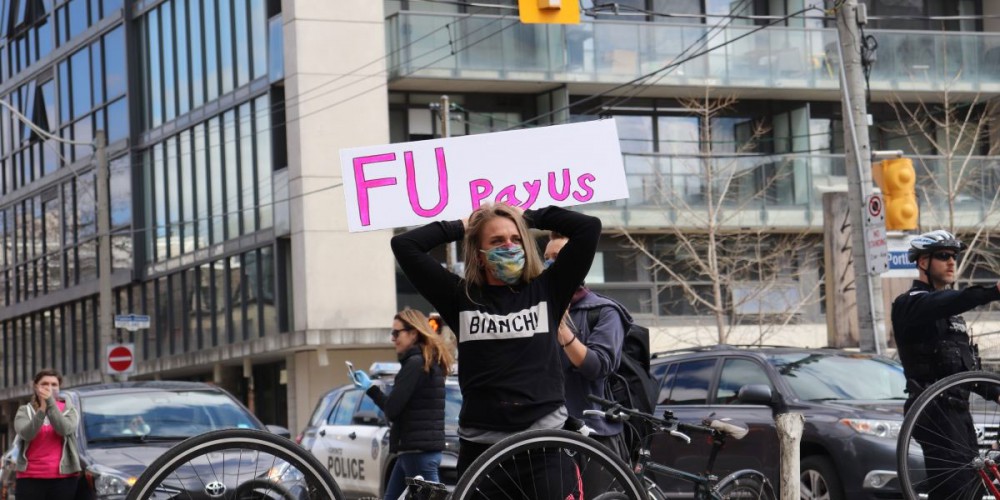
While the current crisis has created an opening for these radical alternatives to profit-driven systems, the right and Silicon Valley technocrats are pushing hard for deeper privatization and austerity measures. Either way, there is no going back to “normal”. Our challenge is to continue building collective power to fight for the best possible futures for our communities.
Update, May 21, 2020: Giving an example of a direct action, this article originally stated that "nurses, personal support workers, and food service workers at Participation House, a care home in Markham for adults with disabilities, walked out after an outbreak of COVID-19 among staff and residents." Their union, SEIU Local 2, disagrees with characterization of the events by management and the media as a walkout or a form of job action. The paragraph has been removed.


